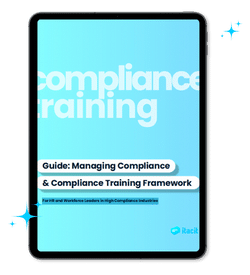Compliance-heavy industries such as banking, auto manufacturers, commercial construction, aerospace, and healthcare require up to date training records and compliance documents.
These protocols provide a safe place to work for the employees, protect the public and the environment, and support a fair and competitive marketplace. Keeping strict records that prove your company is compliant with respect to employee training, operating regulations, and equipment safety ensures that adherence to industry or governmental mandates can be proven.
Failing to keep adequate training and compliance records can result in serious problems for a business. From warnings and fines to loss of operating licences and sanctions, companies who let their compliance tracking slip face serious repercussions.
It’s not for just any reason that these compliance-heavy industries have strict guidelines. Workplace compliance regulation is proven to be a major factor in workplace accident prevention.
We’ve put together a guide to help managers, HR professionals, and team leaders optimize training and compliance record keeping and how to keep this business-critical documentation up to date.
We’ll highlight best practices, common pitfalls, and handy tools to help your company and your employees navigate the often complex web of compliance related paperwork.
Managing Compliance and Training Records
Depending on your industry, the types of compliance documents and mandatory training records can vary significantly. From a compliance standpoint, industries like banking, manufacturing, and healthcare have extremely strict guidelines from both professional associations and governmental agencies.
Compliance to regulations is used by governing bodies for a few important reasons:
- Protects the health and safety of employees and the public (e.g., mandatory and up-to-date machine operator licenses)
- Protects the environment (e.g., manufacturing wastewater treatment
- Supports a fair and competitive marketplace (e.g., antitrust legislation)
In terms of employee skilling and certification, most companies have their own training programs, but there certainly exist some mandatory industry standards. Take the hospitality sector for instance. To serve alcohol in Ontario, every server needs to have up-to-date Smart Serve training. In manufacturing, operator licenses and equipment certifications need to be kept up to date to ensure all processes are being performed safely.
Employee training is tracked for several purposes:
- Certification tracking (e.g., forklift license)
- Employee development, upskilling and reskilling
- Healthy and safety (e.g., COVID protocols or cleaning requirements)
- Security (e.g., email security, passwords, and anti-phishing)
- Resource management (e.g., choosing the right team for a project or taskforce)
For mid-size to large companies, keeping these training and regulatory compliance records up to date and easily accessible can be a complex task. Changing regulations, new hires, equipment upgrades, and expiring licenses add layers of complexities and potentially overwhelming amounts of paperwork.
So, what’s the best way to manage training and compliance records?
Luckily for employers, comprehensive software packages – like an employee app – make managing these important records straightforward and hassle-free.
Using reminders, flags, personal and targeted employee prompts, and digital forms and checklists, digital compliance tracking is a streamlined process that can be implemented into any business.
Digital Forms and Checklists
Using an LMS and/or employee app to track and manage compliance and training records is the most intuitive solution. A comprehensive digital platform can consolidate regulatory compliance documents, as well as training records. The right platform can even directly provide training courses, videos, tests, and evaluation to employees.
Digital forms and checklists take most of the burden off compliance tracking by:
- Setting reminders for employees to finish mandatory training
- Notifying when regulatory, worker or equipment compliance has expired
- Easily dispatching training to individuals or groups
- Consolidating documentation into one place for quick access and review by managers
















